• “Fumes made me go lowbrow, said writer.” (Via.)
• It’s already been widely linked to but as an Amazon review obsessive I’m obliged to point you toward Garth Risk Hallberg’s intelligent essay on the phenomenon. His thesis: that the top reviewers aren’t so much disinterested amateurs as they are “a curious hybrid: part customer, part employee.” (My favorite Amazon reviewer is G. Gibson of Rome, Italy. Misunderstood, maligned: I’ve spent a lot of time thinking about G. Gibson and eagerly await his definitive translation of The Aeneid, which will show all others as the grievous abominations they are.)
• A gallery of photos related to D.H. Lawrence and the Lady Chatterley’s Lover trial.
Archives for January 2008
TT: Who was that masked man?
Yesterday I wrote the first 4,600 words of Chapter 10 of Rhythm Man: A Life of Louis Armstrong from a standing start, beginning at eight in the morning and ending at four-thirty in the afternoon. I still don’t know what hit me, or what I hit.
More as it happens. In the meantime, forgive me if I don’t call you back, no matter who you are. In the immortal words of Crash Davis, a player on a streak has to respect the streak….
UPDATE: I finished Chapter 10 five minutes ago. I am the king of the cats!
TT: Return of a master
In today’s Wall Street Journal drama column I review two plays, Come Back, Little Sheba and Almost an Evening. Here’s a sample.
* * *
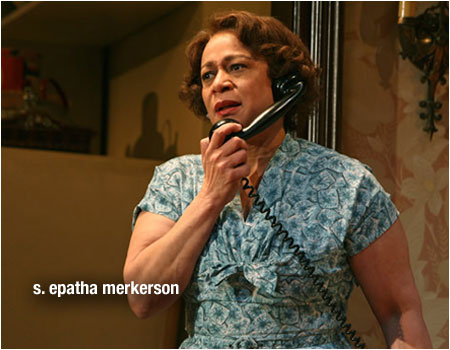 What happened to William Inge? Between 1950 and 1957 he racked up a stunning track record on Broadway–four plays, four hits–and all of his theatrical successes were turned into big-budget Hollywood movies with blue-chip casts. (“Bus Stop” starred Marilyn Monroe, while the Pulitzer-winning “Picnic” featured William Holden and Kim Novak.) For a time critics ranked him right behind Arthur Miller and Tennessee Williams. But Inge lost his sureness of touch as the buttoned-down ’50s gave way to the unsettled ’60s, and after a string of flops, he fled to California to teach and drink, dying by his own hand in 1973. Unlike his more celebrated colleagues, he then vanished down the memory hole, and except for a pair of failed revivals of “Bus Stop” and “Picnic” in the mid-’90s, none of his plays has been seen on Broadway since 1975. Thus it is very big news indeed that “Come Back, Little Sheba” has just been revived on Broadway for the first time since the original production opened there 57 years ago–and that this deeply moving revival, which stars S. Epatha Merkerson of “Law & Order,” is pitch-perfect from curtain to curtain.
What happened to William Inge? Between 1950 and 1957 he racked up a stunning track record on Broadway–four plays, four hits–and all of his theatrical successes were turned into big-budget Hollywood movies with blue-chip casts. (“Bus Stop” starred Marilyn Monroe, while the Pulitzer-winning “Picnic” featured William Holden and Kim Novak.) For a time critics ranked him right behind Arthur Miller and Tennessee Williams. But Inge lost his sureness of touch as the buttoned-down ’50s gave way to the unsettled ’60s, and after a string of flops, he fled to California to teach and drink, dying by his own hand in 1973. Unlike his more celebrated colleagues, he then vanished down the memory hole, and except for a pair of failed revivals of “Bus Stop” and “Picnic” in the mid-’90s, none of his plays has been seen on Broadway since 1975. Thus it is very big news indeed that “Come Back, Little Sheba” has just been revived on Broadway for the first time since the original production opened there 57 years ago–and that this deeply moving revival, which stars S. Epatha Merkerson of “Law & Order,” is pitch-perfect from curtain to curtain.
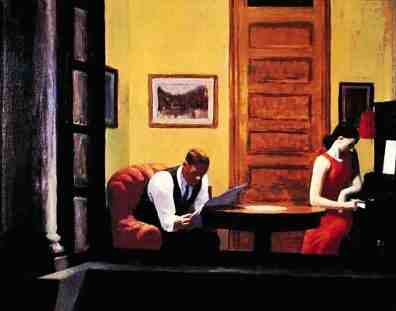 A good staging can’t save a bad play, but it can paper over the cracks in a creaky one, so I want to start off by saying that “Come Back, Little Sheba” is close to flawless. I’d never seen it on stage prior to this revival, and I had no idea what a wallop it packed. It is, like all of Inge’s major plays, a tale of disappointment and frustration set against a shabby, penny-plain backdrop of ordinary middle-class life–you might be watching an Edward Hopper painting come to life–and much of its impact arises from the patience with which the author deals his thematic cards, waiting until just the right moment to throw down his hand and fill the stage with pain and sorrow….
A good staging can’t save a bad play, but it can paper over the cracks in a creaky one, so I want to start off by saying that “Come Back, Little Sheba” is close to flawless. I’d never seen it on stage prior to this revival, and I had no idea what a wallop it packed. It is, like all of Inge’s major plays, a tale of disappointment and frustration set against a shabby, penny-plain backdrop of ordinary middle-class life–you might be watching an Edward Hopper painting come to life–and much of its impact arises from the patience with which the author deals his thematic cards, waiting until just the right moment to throw down his hand and fill the stage with pain and sorrow….
I’m no fan of the Coen brothers, whose smirking nihilism has always left a nasty taste in my mouth. Still, you can’t help but respect the sheer professionalism of films like “Fargo,” “O Brother, Where Art Thou?” and “No Country for Old Men,” and so I was eager to see what “Almost an Evening,” Ethan Coen’s playwriting debut, might have to offer. The answer, as befits a nihilist, is nothing whatsoever….
* * *
Read the whole thing here.
TT: Almanac
“Great simplicity is only won by an intense moment or by years of intelligent effort, or by both. It represents one of the most arduous conquests of the human spirit: the triumph of feeling and thought over the natural sin of language.”
T.S. Eliot (The Athenaeum, Apr. 11, 1919)
TT: Milestone
Yesterday I wrote my drama column for Friday’s Wall Street Journal in the morning, then conferred by telephone with Paul Moravec about the fourth scene of The Letter. In the afternoon I finished writing the ninth chapter of Rhythm Man: A Life of Louis Armstrong. I have three chapters to go.
I can’t quite grasp the fact that I knocked off an entire chapter in three days. (It must be Mrs. T’s cooking.) Needless to say, I plan to push on to Chapter 10 at once, but for the moment I feel like celebrating. In case you care to join me, here’s an excerpt from the chapter I just wrote.
The year is 1937. Armstrong has just signed with a new manager and a new record label, made his feature-film debut in Bing Crosby’s Pennies from Heaven, and become the first black person to host his own variety show on radio. He is now famous, not just in the world of jazz or among his fellow blacks but to the American public at large. This is a brief glimpse of what his life is like.
* * *
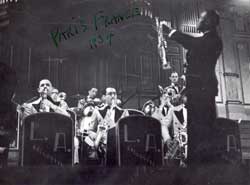 Being a star made little difference to Armstrong’s everyday life. He had always been an uncomplaining workhorse, and Joe Glaser, his new manager, worked him harder than ever now that he was starting to make serious money. “Once we jumped from Bangor, Maine, to New Orleans for a one-nighter, then on to Houston, Texas, for the next night,” Pops Foster, Armstrong’s bassist, recalled in his autobiography. He lived in the continuous present, playing pretty for the people, grabbing a bite to eat between shows, signing autographs after the last set, rapping out a dozen letters on his portable typewriter before bedtime, then repeating the cycle the next day. After each dance he peeled off his sweat-drenched clothes and cleaned himself as best he could. “I mean, you see, places did not have them fine dressing rooms and showers and things then,” Charlie Holmes said. “You just waited until everybody got out of the place, and then he could change his clothes after everybody had gone, and dry himself with his own towels and things.” It wasn’t always that rough–sometimes the band traveled by private railroad car–but more often they rode the bus, and Armstrong rode it with them. “He was a hard worker and a hard-workin’ man,” Holmes added, “and he didn’t ask you to do nothin’ that he wouldn’t do.”
Being a star made little difference to Armstrong’s everyday life. He had always been an uncomplaining workhorse, and Joe Glaser, his new manager, worked him harder than ever now that he was starting to make serious money. “Once we jumped from Bangor, Maine, to New Orleans for a one-nighter, then on to Houston, Texas, for the next night,” Pops Foster, Armstrong’s bassist, recalled in his autobiography. He lived in the continuous present, playing pretty for the people, grabbing a bite to eat between shows, signing autographs after the last set, rapping out a dozen letters on his portable typewriter before bedtime, then repeating the cycle the next day. After each dance he peeled off his sweat-drenched clothes and cleaned himself as best he could. “I mean, you see, places did not have them fine dressing rooms and showers and things then,” Charlie Holmes said. “You just waited until everybody got out of the place, and then he could change his clothes after everybody had gone, and dry himself with his own towels and things.” It wasn’t always that rough–sometimes the band traveled by private railroad car–but more often they rode the bus, and Armstrong rode it with them. “He was a hard worker and a hard-workin’ man,” Holmes added, “and he didn’t ask you to do nothin’ that he wouldn’t do.”
Few survivors of the big-band era have been inclined to romanticize the rigors of life on the road. Charlie Barnet summed it up in six devastatingly well-chosen words: “You stay tired, dirty and drunk.” The trombonist Mike Zwerin, who toured with Claude Thornhill in the Fifties, was more expansive about its horrors: “You skim more than read, pass out rather than fall asleep. You work when everybody else is off, breakfast in the evening, dinner at dawn. Disorder is the order, physical alienation is so powerful, so omnipresent, that no treatment seems to extreme. Nobody can even question the need for treatment. Playing chess will not do the trick. You’ve got to find a familiar internal place to hang on to, it’s a matter of survival. And there is one place, a warm corner called stoned.” Armstrong curled up in that corner most nights, though he was disciplined in his use of marijuana, his drug of choice. “He never worked with it,” said one of his sidemen. “He’d wait until he got off and get with his typewriter and hunt and peck jokes. When he’d write someone a letter, that would be his letter. He’d send them a joke….Write jokes every night. Get off of work, put some salve on his lips, handkerchief on his head.”
It was no way to live, but the trumpeter knew no other, and he appeared by all accounts to thrive on it. His playing, according to Charlie Holmes, was better than ever: “Other trumpet players would hit them [high] notes, just like they do nowadays. They’d be hitting high notes, but they sound like a flute up there or something. But Louis wasn’t playing them like that. Louis was hittin’ them notes right on the head, and expanding. They would be notes. He was hittin’ notes. He wasn’t squeakin’. They wasn’t no squeaks. They were notes. Big, broad notes. And nobody had never heard no trumpet player like that before….The higher he went, the broader his tone got–and it was beautiful!”
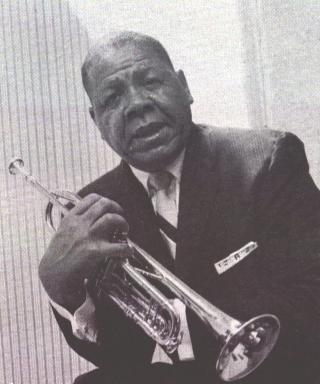 But even Armstrong had his limits, and Glaser, unlike his predecessor, was smart enough to recognize them. In 1937 he hired J.C. Higginbotham and Henry “Red” Allen, both of whom had graced Luis Russell’s group back in the days when it was known as one of the hottest bands in Harlem. Allen, a fellow New Orleans expatriate and alumnus of Fate Marable’s floating conservatory who had, like Armstrong, worked with Joe Oliver and Fletcher Henderson, was a hugely imaginative trumpet soloist with a knack for making harmonically “wrong” notes sound right. Not only had he recorded with Armstrong back in 1930, but the two men had even split a chorus on “I Ain’t Got Nobody,” interweaving their styles so seamlessly that few could (or can) tell them apart. Glaser hired Allen to be Armstrong’s relief man, a role he played so well that he would be billed as “LOUIS ARMSTRONG’S UNDERSTUDY.”
But even Armstrong had his limits, and Glaser, unlike his predecessor, was smart enough to recognize them. In 1937 he hired J.C. Higginbotham and Henry “Red” Allen, both of whom had graced Luis Russell’s group back in the days when it was known as one of the hottest bands in Harlem. Allen, a fellow New Orleans expatriate and alumnus of Fate Marable’s floating conservatory who had, like Armstrong, worked with Joe Oliver and Fletcher Henderson, was a hugely imaginative trumpet soloist with a knack for making harmonically “wrong” notes sound right. Not only had he recorded with Armstrong back in 1930, but the two men had even split a chorus on “I Ain’t Got Nobody,” interweaving their styles so seamlessly that few could (or can) tell them apart. Glaser hired Allen to be Armstrong’s relief man, a role he played so well that he would be billed as “LOUIS ARMSTRONG’S UNDERSTUDY.”
Armstrong featured Allen extensively at his public appearances. “Louis gave Red an hour’s time on his own, to play his own numbers….Red could do anything he wanted to play,” Charlie Holmes said. In the recording studio, by contrast, Allen stuck exclusively to ensemble parts–he only recorded one solo with the Armstrong band–but that was fine with him. “It was no fault of Louis’, and I played plenty with the band,” he recalled. “It was a happy feeling. I don’t care whose band it was, I’d have been happy about it if Louis was there, because I enjoy being in his company so much, on and off the bandstand.”
Armstrong was glad to have him there, too. At the age of thirty-six he was learning at last how to burn the bright candle of his talent at one end, and for the rest of his life he would take care to make room on the bandstand for musicians who could help him carry the load without stealing the show out from under him….
TT: So you want to see a show?
Here’s my list of recommended Broadway and off-Broadway shows, updated weekly. In all cases, I gave these shows favorable reviews in The Wall Street Journal when they opened. For more information, click on the title.
Warning: Broadway shows marked with an asterisk were sold out, or nearly so, last week.
BROADWAY:
• Alfred Hitchcock’s The 39 Steps (comedy, G, suitable for bright children, closes Mar. 23, reviewed here)
• August: Osage County (drama, R, adult subject matter, closes Apr. 13, reviewed here)
• Avenue Q * (musical, R, adult subject matter and one show-stopping scene of puppet-on-puppet sex, reviewed here)
• A Chorus Line (musical, PG-13/R, adult subject matter, reviewed here)
• The Farnsworth Invention (drama, PG-13, reviewed here)
• Grease (musical, PG-13, some sexual content, reviewed here)
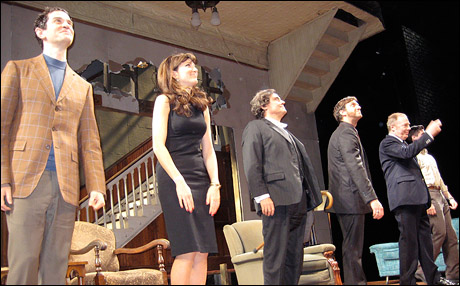 • The Homecoming (drama, R, adult subject matter, closes Apr. 13, reviewed here)
• The Homecoming (drama, R, adult subject matter, closes Apr. 13, reviewed here)
• Is He Dead? (farce, G, reasonably family-friendly, reviewed here)
• The Little Mermaid * (musical, G, entirely suitable for children, reviewed here)
• November (comedy, PG-13, profusely spattered with obscene language, here)
• Rock ‘n’ Roll (drama, PG-13, way too complicated for kids, closes Mar. 9, reviewed here)
• The Seafarer (drama, PG-13, adult subject matter, reviewed here)
OFF BROADWAY:
• The Fantasticks (musical, G, suitable for children old enough to enjoy a love story, closes Feb. 24, reviewed here)
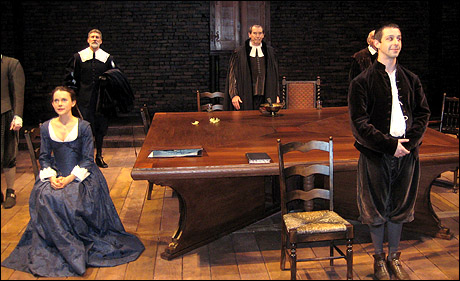 • The New Jerusalem (drama, G, too complicated for children but accessible to mature adolescents, extended through Feb. 20, reviewed here)
• The New Jerusalem (drama, G, too complicated for children but accessible to mature adolescents, extended through Feb. 20, reviewed here)
CLOSING SOON:
• The Devil’s Disciple (drama, G/PG-13, not suitable for children, closes Feb. 10, reviewed here)
CLOSING NEXT WEEK:
• Happy Days (drama, PG-13, too complicated for kids, closes Feb. 2, reviewed here)
TT: Almanac
“People say we’re a country divided, but we’re not a country divided. What we are is a democracy.”
David Mamet, November
OGIC: Morning coffee
Yep–I’m stealing a page from Carrie’s playbook. It’s a good book!
● David Ulin is wary of rereading once-loved books:
…you never know how a book will stick the second time around, whether it will continue to resonate or leave you oddly unfulfilled. That’s what happened with “Wise Blood,” a book that I revered in my late teens and early 20s; when I reread it this year, at the age of 45, it seemed to me less like a fully realized work of fiction than a young writer’s pastiche, flat in its way, two-dimensional, not about life as it really is but a naif’s projection of the way life could be.
It’s depressing when you lose a book like that, which is exactly what has happened: I’ve lost “Wise Blood” for good. It makes you gun-shy, wary of returning to an author; although O’Connor’s second novel, “The Violent Bear It Away” (Farrar, Straus & Giroux, $14 paper), was also recently reissued, I can’t bring myself to reread it, since I don’t want it to dissipate for me as well.
● Peter Suderman thinks that blogs are the vehicle that television criticism has been waiting for all these years:
Clearly, [the blogging of The Sopranos‘ last season] showed that the two mediums belong together. Traditional newspaper reviewing has never been all that successful at writing about television. Reviewers are given a few episodes of a show before a season begins and expected to extrapolate, based on just a few, early hours, on the show’s potential for success. But in the age of lengthy, arc-driven serials, one-time coverage of a story’s beginning doesn’t cut it. It’s the equivalent of a movie reviewer writing a review after seeing only the film’s first act. (Admittedly, this is easier than it sounds; rare is the movie that eventually reverses whatever opinion I hold of it at the 45 minute mark. But though you can often tell whether a film will be any good, it won’t leave you with much to actually say about it – which explains some of the weaknesses in television criticism.)
Even more to the point, regular blogging can cover the water-cooler buzz surrounding a show during a season. Part of the fun of being a TV fan these days is the anticipation, the guessing games, the questions and the chatter. No newspaper can really afford to devote enough column inches to the sort of obsession and minutiae that has become de rigueur for television fandom.
